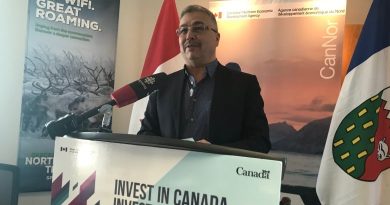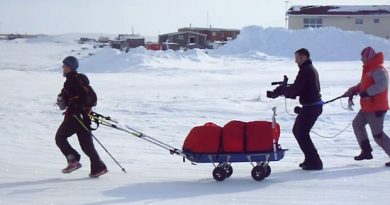FEATURE INTERVIEW: Would a Canada-U.S. merger be good for the Arctic?

Canada and the United States have a reputation for being among the world’s friendliest neighbours.
They share a common language, a common culture and what’s regularly touted as the longest undefended border in the world.
The Free Trade Agreement between the two nations in 1987 created even stronger economic links.
But American-Canadian columnist Diane Francis, one of Canada’s best known and most provocative business writers, says that Canada and the U.S. haven’t gone far enough.
In her controversial new book, Merger of the Century: Why Canada and America Should Become One Country, Francis argues that in order for the two countries to take on the world’s increasingly complex economic challenges, they need to become one nation.
She warns that the cost of doing nothing could have serious consequences, especially for the Arctic.
I spoke to Diane Francis earlier this week to find out why.
Eye on the Arctic: How did you come to write this book and why did you want to get people discussing these ideas?
Diane Francis: Canada has an enormous resource endowment in the North. The Chinese and the South Koreans and all kinds of other people have their eye on it. We have an existential challenge. The United States and Canada are free enterprise democracies. We’re facing a big struggle for living standards and resources against these large entities that are known as the sate capitalist model. They use their companies and their governments as instruments of economic growth.
Russia has laid its claim to the entire Arctic including much of what Canada thinks is its sovereign portion. What are Canada and U.S. going to do about the wolves at the door? How are we going to realize all the wonderful synergies that we could if we integrated more. Then I came up with what I call a thought experiment. I looked at seven different models for further integration including going all the way like Germany did in 1990 and merging the two. That’s a very dramatic, radical idea that a lot of Canadians don’t like but I’ve put it out there. Benefits and downsides.
EOTA: You talk a lot about the vulnerability of the Canadian Arctic compared to the other circumpolar countries. Tell us why you see it that way.
DF: Canada’s three territories are three times larger than the Alaskan landmass. Alaska and the Northwest Territories discovered oil and gas about 30 years ago. In eight years, the U.S. had settled claims with the aboriginals. They had a pipeline flowing down to Valdez.
Built and done.
They have dozens of mines and dozens more projected. They have a $60-billion dollar heritage surplus fund. They give people an average of $1000- $1200 a year in royalty payments. The have 25 major sea ports. They have rail and road and cities and seven times the population of our Arctic. We don’t have a world class sea port. We don’t even have the permits for the Mackenzie Valley gas pipeline and by the way, gas is so cheap now it’s probably never going to be built. We’ve completely missed the boat.
EOTA: Would the American Arctic benefit from a merger with Canada?
Everybody would benefit in a scenario of some kind of partnership. We could create millions of jobs. Could it be like Germany? Or could we do it like the European Union where we create a fourth level of government.
I just want Canadians and Americans to realize they need each other. They have a lot of synergies. They really like each other. They’re both great countries. And one plus one in some way, shape or form could equal four and propel us into the future with more national security, energy security and economic development , potential and opportunities.
EOTA: There’s been Arctic pundits that are looking more and more to the cooperation in the Barents region between Norway, Sweden, and Russia and Finland, and the economic spinoffs and benefits that have come from that. Some of them are saying that it should inspire Alaska, the Yukon and the Northwest Territories to start looking at the Beaufort as a region and making decisions together. Does this mean that you’re on to something?
DF: I was invited by the Northwest Territories Chamber of Commerce to be a key note speaker two weeks ago and that’s exactly what I said. And I threw Alberta into the mix. Northwest Territories, Yukon and Nunavut have Alaska and Alberta on their borders, two of the richest jurisdictions on the planet. That looks like a pretty good partnership to me.
Let’s also remember Canada keeps saying the Americans can’t patrol or have any jurisdiction in our Arctic area. But we don’t have any. We have a navy with 8500 people and the biggest coastline on the planet. It’s just not sustainable.
EOTA: How likely that we’ll see a merger in our lifetime?
DF: We better see it sooner rather than later. I’m not talking about a full-blown political merger. But Canada and the U.S. are still stuck where they were when they signed the free trade deal in 1987. The Caribbean, the west African nations, the EU, they’ve all gradually got into erasing borders and having common currency and all of these things that reap enormous benefits for the population.
We haven’t even started to do that. We’ve got a lot of work to do.
(This interview has been edited and condensed)



